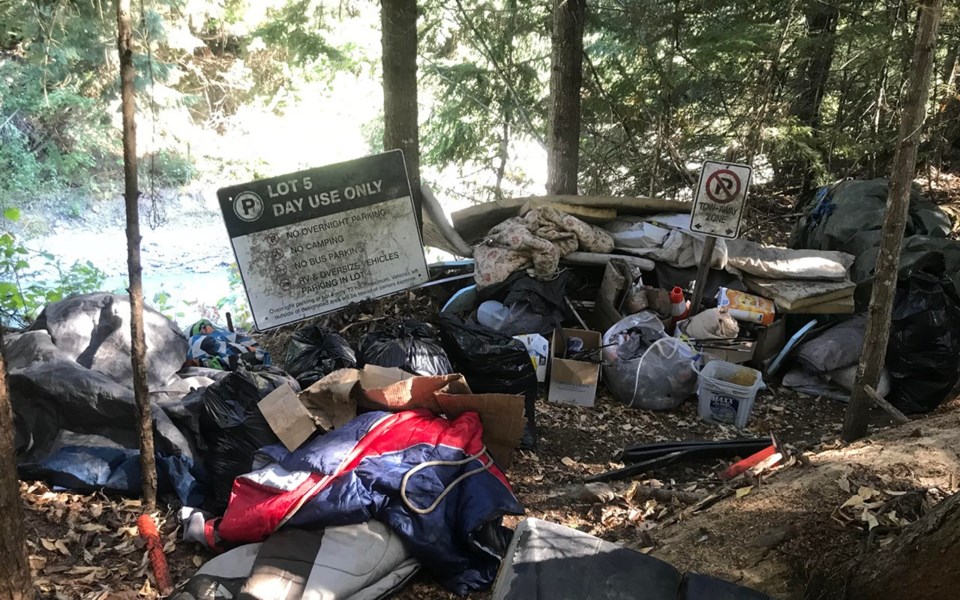A waste removal company contracted by the Resort Municipality of Whistler (RMOW) removed truckloads of garbage this week from an illegal campsite hidden in plain view of the Upper Village.
Adrian Moran, co-owner of 50 North Exterior Property Detailing, said his company removed three truckloads worth of trash over two days from an illegal campsite that had popped up near the Squamish Lil'wat Cultural Centre.
Workers removed everything from clothing to old snowboard boots, food wrappers and tins, a sleeper couch, and "at least" 2,000 cigarette butts, Moran said. "One of the things that took us the longest was picking up the cigarette butts. They were just everywhere."
The campground was located on a small island in Fitzsimmons Creek, roughly the size of two tennis courts, Moran said, in between the skate park and the cultural centre. Estimating there were remnants of at least 12 campsites, Moran said the wooded area appeared to be purposefully disguised from prying eyes.
"It was hidden right there," he said. "There was effort that had gone into the perimeter: there were stick structures to make it more covered."
This is the fourth time this year that 50 North has been hired by the RMOW to remove garbage from illegal campsites, Moran said. A spokesperson for the municipality said in an email that 50 North was contracted in this case because "Bylaw Services did not have the resources or equipment to clean the sites in a timely manner." The spokesperson said that Bylaw and Parks staff have cleaned up garbage from other areas around the community when they have had the necessary resources to do so.
Camping is not permitted on Whistler's roads or in parking lots. The fine for illegal camping is $75. The fine for attracting wildlife is $200. Find more information at whistler.ca/camping.
So far in 2018, the RMOW has received 52 complaints of illegal camping, up from 32 last year, and 54 complaints of individuals living in vehicles, down from 91 complaints in 2017.
The municipality has also stepped up enforcement on those living in their vehicles, issuing a whopping 731 tickets this year, more than double the 276 tickets handed out in 2017.
"This year, Bylaw Services have focused efforts related to people living in vehicles on proactive patrols in residential and parking areas," the municipal spokesperson wrote. "They have focused their efforts related to camping/tenting on managing attractants, education, and referrals to WCSS (the Whistler Community Services Society) for additional resources."
Jackie Dickinson, executive director of WCSS, said the number of "under-housed" community members the non-profit sees coming through its doors reiterates the need to open up a conversation about emergency housing.
"I think it's always a great thing for us to look at some emergency housing options and explore ways to (develop) a cold-weather shelter," she said. "This time of year, when we see a transition from this wonderful, warm weather to eight or nine days of rain, it's not uncommon for us to make stronger or more consistent connections with people who are living outside, because this is the time of year that is most challenging."
WCSS has a taxi voucher program in place to send individuals in need of emergency housing to the Squamish Helping Hands Society, and the non-profit will also provide items from the food bank and clothing from the Re-Use-It Centre for those in need.




